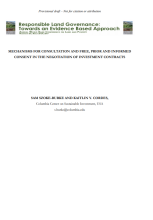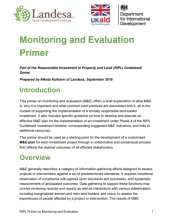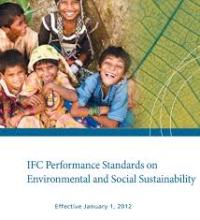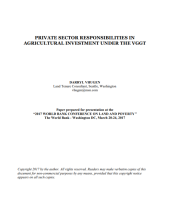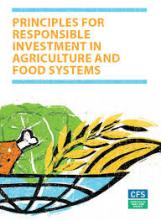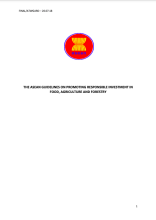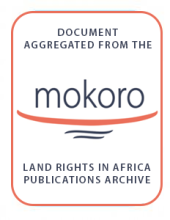Additional Resources
MECHANISMS FOR CONSULTATION AND FREE, PRIOR AND INFORMED CONSENT IN THE NEGOTIATION OF INVESTMENT CONTRACTS
This paper provides guidance on how to integrate consultation and FPIC principles into investor-state contract negotiations to actively involve project-affected communities and better safeguard their land rights and human rights. It proposes various options that may be appropriate, depending on the local context and the community’s resources and decision-making structures.
Monitoring and Evaluation Primer (Responsible Investment in Property and Land (RIPL) Guidebook Series)
This primer on monitoring and evaluation (M&E) offers a brief explanation of what M&E is, why it is important and what common best practices are associated with it, all in the context of supporting the implementation of a socially responsible land-based investment. It also includes specific guidance on how to develop and execute an effective M&E plan for the implementation of an investment.
Obligations Under International Treaties and Conventions
This guidance aims to provide companies with an overview of the links between land and human rights enshrined in these agreements and in official statements issued by treaty monitoring bodies. While it focuses on Ghana with a non-exhaustive examination its human rights obligations with an overview of the most significant agreements pertaining to land-based investments, it will be useful for companies working in other countries because the agreements presented have been ratified and signed by a large number of countries.
Performance Standards on Environmental and Social Sustainability
The Policy on Environmental and Social Sustainability describes IFC’s commitments, roles, and responsibilities related to environmental and social sustainability. The Performance Standards are directed towards clients, providing guidance on how to identify risks and impacts, and are designed to help avoid, mitigate, and manage risks and impacts as a way of doing business in a sustainable way, including stakeholder engagement and disclosure obligations of the client in relation to project-level activities.
PRIVATE SECTOR RESPONSIBILITIES IN AGRICULTURAL INVESTMENT UNDER THE VGGT
This document provides information on implementation of VGGT and a number of checklists that might be helpful for investors and companies on the following topics: Tenure Rights Risk Management Checklist (II.B), Consultation and Negotiation Checklist (III.B), Grievances and Dispute Resolution Checklist (IV.B) and Transparency and Corruption Checklist (V.B).
Responsible Investment in Agriculture and Food Systems
The CFS Principles for Responsible Investment in Agriculture and Food Systems – known as RAI – are a set of ten principles that apply to all types and sizes of agricultural investment including fisheries, forests and livestock. They address all stakeholders and apply to all stages of the value chain. As a soft law instrument they are globally applicable and include actions to address a range of environmental, social and economic issues.
Socially responsible land investment in Ghana: A guidebook for business enterprises considering agricultural investment in Ghana
The Business Enterprise Guidebook aims to help companies and investots understand how to facilitate a responsible investment in Ghana. This Guidebook includes information on international standards and best practices, Ghana’s governance and community landscape, and how to manage an agricultural investment responsibly.
Tackling corruption in land governance
This paper seeks to analyse causes, types and effects of corruption in land governance and provide evidence-based recommendations to address corruption, with a particular focus on Sub-Saharan Africa.
The ASEAN Guidelines on Promoting Responsible Investment in Food, Agriculture and Forestry
The ASEAN Guidelines on Promoting Responsible Investment in Food, Agriculture and Forestry are part of a broad range of initiatives aimed at ensuring that investments in agriculture meet global standards and promote responsible and sustainable investment. The primary purpose of the Guidelines is to promote investment in food, agriculture and forestry in the ASEAN region that contributes to regional economic development, food and nutrition security, food safety and equitable benefits, as well as the sustainable use of natural resources.
The Financial Risks of Insecure Land Tenure: An Investment View
This paper investigates the real financial consequences of investing in land with disputed tenure rights. It demonstrates that companies which ignore the issue of land tenure expose themselves to substantial, and in some cases extreme, risks. Using case study analysis, the paper connects ground-up financial thinking with empirical reality. In so doing, it makes a strong case for the need to integrate tenure-related risks more comprehensively into our financial architecture.


